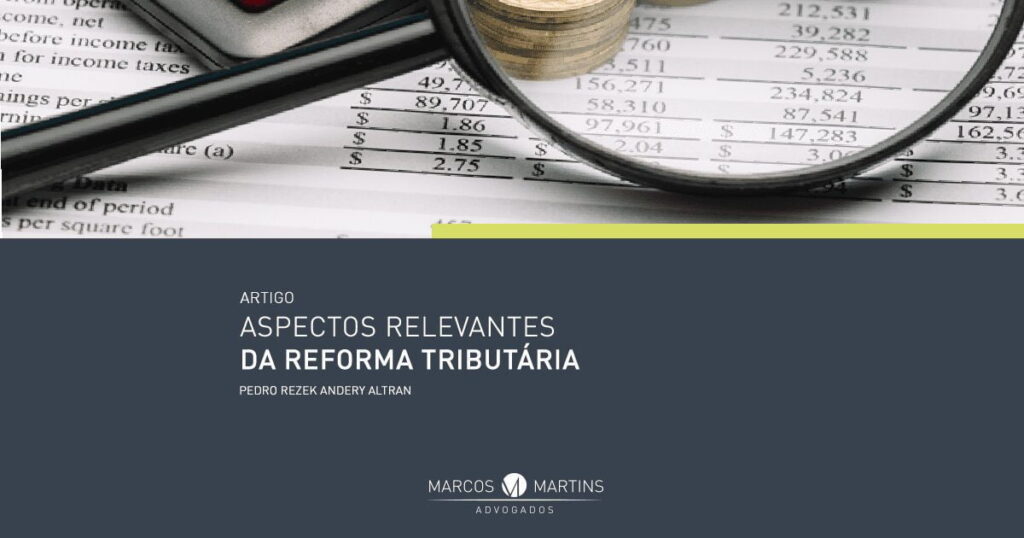
Pedro Rezek Andery Altran
Lawyer at Marcos Martins Advogados
It is undeniable that Brazil needs tax reform. Our tax system is outdated and the most bureaucratic in the world. According to a study carried out by the World Bank in conjunction with PwC (Paying Taxes), Brazil is the leader in the time and resources spent complying with tax obligations.
Given the importance of this reform, caution and attention are needed from our representatives in the Legislative Branch. We are currently aware of four proposals:
- PEC 45/2019 – Author: Deputy Baleia
- Rossi;
- Government PEC – Author: Minister Paulo
- Guedes;
- PEC 110/2019 – Author: Davi Alcolumbre;
- Proposal to be drawn up by the states.
The most advanced is that of Congressman Baleia Rossi, which has already been approved by the Constitution and Justice and Citizenship Commission (CCJC).
The reforms have something in common: they all seek to reduce the amount of taxes, but this is no guarantee that there will be a reduction in the tax burden.
PEC 45/2019 aims to eliminate PIS, COFINS, IPI, ICMS and ISS and create the Tax on Goods and Services – IBS and the Selective Tax (exclusive competence of the Union). It exchanges 5 taxes for 2.
PEC 110/2019, on the other hand, proposes eliminating the IPI, IOF, CSLL, PIS, COFINS, ICMS, ISS, Cide Combustível and Salário Educação, creating the IBS and the Imposto Seletivo, exchanging 9 taxes for 2. In addition, the CSLL would be incorporated into the IRPJ, the ITCMD would be the competence of the Union with Municipal revenue, and the IPVA would be covered, levied on the ownership of aircraft and water vehicles.
The government’s reform has not yet been presented, but it has already been stated that there will only be changes to federal taxes. Minister Paulo Guedes intends to create a Value Added Tax (VAT), unifying the PIS, COFINS, IPI and part of the IOF, change income tax and create a tax on financial transactions (formerly the expanded CPMF).
Because the government’s proposal only touches on federal taxes, the states, through the Committee of State Finance Secretaries, will draw up a proposal for state taxes.
There are also signs of other proposals to come, such as the Brazil 200 Institute, which suggests creating a contribution on financial transactions, with a rate of 2.5%, levied on the payment and receipt of money.
The chances of IPI, ICMS, ISS, PIS and COFINS being abolished to create the IBS are high.
This new tax will have a non-cumulative incidence, i.e. it will be levied on the entire production and consumption chain, resulting in a net incidence only on the added value at the last stage.
It is estimated that its rate will be 25%, being uniform for all goods, services or rights in the territory of the federative entity.
It will have a broad impact on tangible and intangible goods, rights and services.
The PEC also guarantees full and immediate credit for goods and services obtained and in the process of being invested in, which will generate complete exemption from investment.
The definition of what will be characterized as an input will be made by Complementary Law, but what is already in the PEC is that goods and services for personal consumption will not be counted for credit purposes.
The federal selective tax, on the other hand, will have a single-phase incidence, i.e. it will only be levied once in the production and distribution chain.
Its aim will be to discourage the use of certain goods and services, such as cigarettes and alcoholic drinks. The problem arises because PEC 45 also opens up the possibility of this tax being levied on non-alcoholic drinks, which could increase the price of our beloved soft drinks.
The migration from the current tax system to the new model will take 10 years, and in the first two years the IBS will be levied at a rate of 1% for any adjustments. This increase will be offset by a reduction in the COFINS rate.
Brazil seems to be moving towards tax reform, which needs to be beneficial and efficient, and cannot be approved purely for political reasons.
It is important to point out that most of the revenue Brazil collects is committed to the public debt and to paying the high salaries of civil servants, and because of this, along with tax reform, the country’s budget and structure must be reformed in order to make the amounts collected more effective and more profitable.
Tax reform, if done correctly, is only the first step for Brazil towards development.
A lot will change with regard to tax reform, there are worrying and alarming issues in the PEC’s presented, which will be the subject of the next article.








